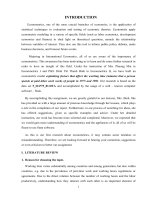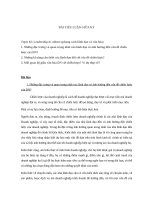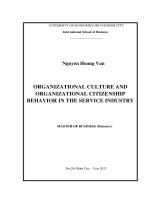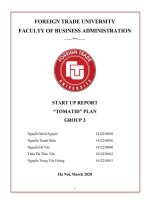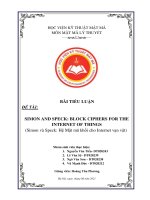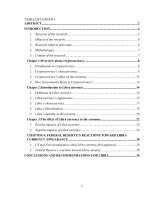tiểu luận japanese communication culture and plan forwelcome guests visit the farm andprocessing factory
Bạn đang xem bản rút gọn của tài liệu. Xem và tải ngay bản đầy đủ của tài liệu tại đây (1.01 MB, 13 trang )
<span class="text_page_counter">Trang 1</span><div class="page_container" data-page="1">
<b>DA NANG UNIVERSITYUNIVERSITY OF ECONOMICS</b>
<i><b>Da Nang, 3/2024</b></i>
</div><span class="text_page_counter">Trang 3</span><div class="page_container" data-page="3"><b>1.1 Individualism </b>
Japan is an extremely collectivist country. The Japanese view success andfailure as a common matter between groups, and each individual in the group,regardless of circumstances, participates in the collective success or failure achievedby the group. Japanese people are famous for their ability to put aside their egos toachieve harmony with other group members and promote the greater good.Japanese people rarely argue or say insulting things to others in meetings.
However, as the market economy and individual rights grew, so didglobalization. While Japan values collectivism, some aspects of society are graduallychanging towards individualism.
<b>1.2 Time Orientation </b>
Japan has seen an amazing economic resurgence with few natural resources.Visibility, a lengthy investment period, and effective resource management arenecessary for this procedure. The necessity of a long-term vision has becomeapparent as a result of overcoming this catastrophe. Establishing a social foundationhas been made easier by concentrating on producing assets with steady value andpreserving economic stability, as well as the spirit of resource conservation andefficient use.
Otherwise, Japanese are very strict about time. For Japanese individuals,cultivating positive relationships with others is based on their culture of punctuality.Being punctual for the appointment is crucial to earning the other person's trust andexpressing the respect for the other person. Furthermore, they have a clear divisionbetween work and personal life.
<b>1.3 Power Distance </b>
Power Distance is highly valued in Japanese society. Respect is required ofindividuals in high position , such as elders in society, upper class, top managers,supervisors.
Age and position are significant in Japanese society. People who are older orhave more life experience and competence are frequently seen as having moreauthority and power. The Japanese are conscious of their hierarchical position in anysocial environment and act accordingly. Proposed opinions are distributed at work toall enterprise management levels , and all decisions need to be approved at the endby upper management.
Nowaday,power distance are moving towards a more equal society, especiallyin the workplace and the younger generation.
<b>1.4 Uncertainty Avoidance </b>
Coming from a country with high scores on UAI (Risk Avoidance), Japanesepeople are always worried about unpredictable events in life such as naturaldisasters and Epidemics, and they are careful and discreet people. They do noteasily accept new things and changes that they have never experienced in their work
1
</div><span class="text_page_counter">Trang 4</span><div class="page_container" data-page="4">culture. Therefore, we can see that they often live and work by tradition, by the lawsand thoughts left by the ancients.
Japan's score of 92 indicates one of the highest risk aversion countries onEarth. This is because Japan is constantly threatened by natural disasters ranging.Japan has learned to prepare itself for any uncertain situation, emergency plans andpreventative measures not only for unexpected natural disasters but also for everyother aspect of society.
Japanese people often do not want to do things without precedent. Japanspends a lot of time and effort on feasibility studies and all risk factors must beaddressed before any project can begin. Managers require all the detailed facts andfigures before making any decisions.
<b>1.5 Formality </b>
The Japanese are strict adherents of rules and etiquette in most aspects ofdaily life. In daily communication, Japanese people often bow by bending down(Ojigi) and the degree of lowering depends on the social status of both people. Thisis an important sign of respect.
In cuisine, Some things to keep in mind are that there should never be anyleftovers and requests to take leftovers home are usually not accepted. When eatingin a group, people often don't start eating until all members have food in front ofthem.It can be said that in Japan, whatever you do is highly predictable andregulated into mandatory customs and rituals. At weddings, funerals, in the office, atimportant meetings and other social events, what people wear and how peopleshould behave are prescribed in great detail.
<b>1.6 Materialism </b>
Japan is poor in resources, except for one special resource that is not poor:people. The education system is seen as the key to politically stable economicgrowth. Investing in education has great significance for the country. At the individuallevel, Japanese people today are judged mainly based on education, not familystatus, social status and income.
One of the most notable characteristics of the Japanese is their boundlessdesire for personal growth. The Japanese social system gives Japanese people thebelief that their fate is determined by their hard work and education, and importantly,they also believe that from the beginning they all have equal opportunities. Therefore,most Japanese people believe that they live in a classless, homogenous socialenvironment, in which origin and inheritance are less important than individual effort.
<b>1.7 Context Sensitivity</b>
In Japan, context sensitivity is a crucial component of communication andculturalization.They honor customs and cultural values. This is mostly the result of aconfluence of political, historical, and cultural elements. Indirect and face-savingcommunication is preferred in Japan, where care and respect must alternate. Theyfrequently take care to avoid embarrassing or offending other people. That willprobably have an impact on these other domains as well as business, politics, andinterpersonal connections on a daily basis.
<b>Too long to read onyour phone? Save</b>
to read later onyour computer
Save to a Studylist
</div><span class="text_page_counter">Trang 5</span><div class="page_container" data-page="5">Aside from that, safeguarding our national security is a major priority forJapanese people, particularly in the face of foreign threats.When faced with delicatematters pertaining to politics, history, territorial sovereignty, and national security,they acted swiftly and forcefully.
<b>2. Compare the business communication culture of Japan and Vietnam</b>
- There is a tendency to befriendly and approachable, openin sharing experiences andpersonal opinions.
- If oneself is not an outstandingtalent, it will be difficult to benoticed.
- Most people see individualmistakes as a personal issueand take responsibilityseparately.
- Group thinking andconsensus are often prioritizedover making individualdecisions.
- There is a tendency to keep adistance from strangers,politeness and respect incommunication are oftenconsidered more important.- Standing out is not alwaysgood. Companies often valuethe ability to share knowledge,help others develop, ratherthan emphasizing a lonebrilliant talent.
- The role of the team is veryimportant. Every individual'ssuccess or failure is theresponsibility of the entireworking group.
- They all set a high standard for respecting time. They highlyvalue punctuality and organization in their daily schedules.- Can be more flexible in
handling time and may notalways adhere to a fixedschedule.
- The awareness of timemanagement principles inVietnam seems to be not highlyemphasized.
- Tendency to make specificplans and always adhere tothose plans.
- Strict adherence to time.- Being late is consideredimpolite behavior, causinginconvenience to others, evenif only 1 minute late.
3
</div><span class="text_page_counter">Trang 6</span><div class="page_container" data-page="6">- Being seven minutes late forappointments is common, andfew people complain about itbecause it has deeply ingrainedin the lifestyle.
- Valuing social and familyrelationships over managingtime seriously.
- Accepting a clear divisionbetween work and personallife.
- There's a high Power Distance that leads to relatively highlevels of inequality.
- There's a long tradition of respect and adherence to the leader,who has a high position in society.
- Vietnam scores high (point70), because of the prolongedacceptance of inequalitybetween people and people.
- Vietnamese accept a hierarchyin which everyone has a placeand no further justification.
- In a working culture,employees do what their bosssays because they take it astheir duty, it's a matter ofcourse.
- Power Distance are very clearand it's difficult to move aperson from a lower class to ahigher class.
- Reflecting the inherentinequality, centralization iscommon, subordinates want tobe told what to do, and the idealboss is a benevolent autocrat.
- Japan with an average of 54.
- The Japanese are consciousof their hierarchical position inany social environment and actaccordingly.
- In a working culture, not asstrictly hierarchical as mostother Asian cultures.
- Power Distance are movingtowards a more equal society,especially in the workplaceand the younger generation.
- Reflect more "flat"organizational structure,focusing on cooperation,teamwork and mutual respect.
4
</div><span class="text_page_counter">Trang 7</span><div class="page_container" data-page="7">- Vietnam has a low score(point 30)
- Vietnam has tolerance, fewrules, and acceptance ofinnovation goes hand in handwith more mistakes and moredeviations from norms.
- In Vietnam, low UncertaintyAvoidance helps membersbecome familiar and graduallyaccept uncertainty:
+The company tends toreconcile actions and opinionsthat differ from themselves(because they don't feelscared).
+Managers are quick andcomfortable in taking risks, sothey make decisions fairlyquickly, they're less concernedabout future consequences.
- Japan scored 92, one of thehighest scores on earth.- Japan is perfect andprincipled, they ask for all thefacts and details beforemaking a decision. Therefore,they do not accept misleadingand subjectivity.
- In Japan, high UncertaintyAvoidance so they set uporganizations to minimize riskand ensure safety:
+Companies concentrate oncreating stable jobs and settingregulations to regulate work. +Leaders take a lot of time tomake decisions (taking intoaccount all possible risks),avoiding leaving theconsequences in the future.
Vietnamese tend to be moreresilient than Japanese when
- The Japanese are stricterthan the Vietnamese becausethe Japanese tend to be morecareful, more serious andmore disciplined.
- Japanese products careful,careful to every detail, almostno defects.
- The Japanese are not justdressed in the right place, but
5
</div><span class="text_page_counter">Trang 8</span><div class="page_container" data-page="8">mistakes are not uncommon.- Vietnamese also value privacybut not as much as Japanesewhen Vietnamese are quitecomfortable talking about theirown personal, family withoutrestraint, annoyance.
the way they keep their hairand nails is a remarkablefeature.
- The Japanese value theirprivacy more than theVietnamese, but their privacymust be understood as "
." They'reputting them in such a tightway that no personalinformation is usuallymentioned.
- All have materialism and spirituality.
-Because of social, cultural, andeconomic differences,Vietnamese materialism is lessimportant than Japanese.-Vietnamese usually only shopwhen they meet their essentialneeds, if compared to worldGDP in 2022, the Vietnameseare only 135th, while Japan is47th.
- Japanese people are veryeconomical, since childhoodthey have been educated witha sense of economics, creatinga nature of appreciation of thematerial value of the Japaneseman.
- Japanese people shop a loteven though they save, soJapan is a country with hugepurchasing power, boostingthe economy.
- We are very concerned about protecting our national security,especially in the face of external threats.
- Reacted quickly and decisively to sensitive issues related tonational security, territorial sovereignty, history, politics.- Respect for culture and traditional values.
In 2009, 81.68% of Viet Nam'spopulation was ethnic and non-religious.
- Sensitive to historical woundsand sensitivities such as war,political-social transformation,territorial disputes.
-In 2006, 51.82% were eitherreligious or non-religious.- You can say no nation is assensitive to the new as theJapanese. They're constantlymonitoring the changes in theworld, weighing the impact ofmajor trends and trends onJapan.
6
</div><span class="text_page_counter">Trang 9</span><div class="page_container" data-page="9">- Sensitivity to issues ofgender-based bias anddiscrimination
<b>7:00 - 8:00 am: Pick up guests from Tan Son Nhat International Airport and</b>
transfer them to the hotel.
<b>(Note: Transfer Team with Signage based at Tan Son Nhat International Airport</b>
and remember to do bowing, or "ojigi," which is fundamental to Japanese society. It’sa Japanese greeting that expresses respect, gratitude, or apology.)
<b> 8:00 - 9:00 am: Check in at Sheraton hotel </b>
<b>(Note: After the guest checks in, the hotel desk must give each of them a name</b>
tag and gifts (an umbrella and a small crossbody bag). Also; prepare wet towels andwater)
<b>9:00 - 11:00 am: Break & refresh at Hotel for the Opening ceremony & lunch</b>
in Sheraton hotel.
<b>11:00 - 12:00 pm: Opening ceremony.</b>
_Read the opening speech and tell the company’s mission and vision._ Organize performances (singing, dancing) and lion dances for guests.•Participants:
_ Direct: General manager_ Heads of faculties_ External experts
<b>12:00 - 13:30 pm: </b>Have lunch at the restaurant in the Sheraton hotel.
<b>(Note: As a courtesy, ask the elderly and those with high social standing to sit in</b>
the middle and invite them to eat first. In order to put everyone at ease, a happy storymust be started.)
<b>14:00 - 17:00 pm: Transfer visitors to fish farm.</b>
_ Outlining the procedure and the workings of the fish farm._ Show clients that the aquaculture process is hygienic and secure.
_ Show customers how to raise various fish species and introduce them to theaquarium trade.
_ Introducing cutting-edge fish-raising technologies
7
</div><span class="text_page_counter">Trang 10</span><div class="page_container" data-page="10"><b>(Note: Keep in mind that Japanese people value cleanliness and safety, so</b>
concentrate on discussing those topics and be prepared to respond to inquiries andoffer precise, thorough information.)
•Participants:_ Heads of faculties_ External experts_ Fish farm management
<b>17:00 - 19:00 pm: Break & Refresh at Hotels for Dinner & Evening in Ho Chi</b>
<b>19:00 - 20:00 pm: Transfers for Dinner in La Casa Del Habano </b>
<b>(Note: Time is very important to Japanese people, so get the vehicles ready on</b>
<b>7:00 - 9:00 am: Have breakfast at the hotel</b>
<b>9h30 - 12:00 pm: Transfer visitors to visit the seafood processing factory</b>
_ Describing the steps involved in processing and importing raw materials_ Introducing the technology used in the factory
_ Assure customers about safety and hygiene issues in the factory
_ Process the company's products into dishes and invite customers to experiencethem
•Participants:_ Heads of faculties_ External experts_ Factory management
<b>(Note: Be prepared to respond to inquiries and offer precise, thorough information)12:30 - 14:00 pm: Transfer customer to D’maris restaurant to have buffet.14:00 - 17:00 pm: Transfer to the company to talk about business-related</b>
_ Negotiate prices for different types of products
_ Conditions of the contract, promise to execute within the agreed upon time frame_ Decision to sign the contract
_ Direct: General manager_ Heads of faculties_ External experts
_ Regional Distribution Director of Ho Chi Minh City_ Secretary
<b>17:00 - 18:00 pm: Rest at Hotels and check out </b>
<b>18:00 - 21:00 pm: Closing ceremony/Dinner- Pool - BBQ at Sheraton hotel</b>
_ Read the closing speech
_ Organize a dance party with light music for guests8
</div>

